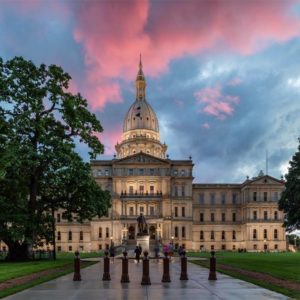By Paul Rozycki
“Politics is more difficult than physics.”
–Albert Einstein
Last month’s East Village Magazine was devoted to the idea of good governance and the problems with dysfunctional government in Genesee County, as we took a look at the Flint City Council, the Flint Community School Board, and the many problems they have faced. Some of those problems have been blamed on “politics” or “politicians.” Sometimes, it seems that if we could just get rid of politics and politicians our problems would be solved.
But maybe the opposite is true. Maybe we just need to elect those who are good at politics in the best sense of the word.
Avoiding the politician label
I had a good friend who had served in several elected political positions in Flint and Lansing over his long career. By every measure he was a political leader. However, whenever I introduced him as a “politician” he would correct me, and say he was a “public servant.” Or, with a teasing smile, sometimes he would say a “statesman.” He wasn’t unique in his desire to avoid the politician label.

In a similar vein, my wife Nancy and I often go to Bronner’s in Frankenmuth, where she buys ornaments to give to friends for Christmas, birthdays, graduations, and anniversaries. When looking around the huge store it seems that they have ornaments for every occasion and every interest. In particular, they have ornaments for almost any occupation.

You can buy ornaments to honor doctors, nurses, teachers, accountants, reporters, computer operators, social workers, weather forecasters, truck drivers, artists, police officers, postal workers, athletes for almost every sport, and dozens of other occupations.
But there is one they don’t seem to have.
I’ve never seen an ornament to honor politicians. They have some for Democrats, some for Republicans, but none for elected politicians.
“I’m not a politician”
What’s curious is that even those seeking political office often deny they are politicians. How often do we hear a campaign pitch saying that we should elect someone because they are “not a politician” and they are a businessman, a farmer, a teacher, or some other occupation? In a recent televised debate before the primary election, five candidates who were running to be governor of Michigan spent a good part of an hour accusing each other of being “politicians” as if it were a curse word.

Campaign signs in front of Flint City Hall, November 2020. (Photo by Paul Rozycki)
Yet those who reflect the wishes of the voters and manage the business of government are politicians. Like any occupation some of them are very good at it. Others not so much. A functioning democratic government needs those who are good at the art of politics. Politics is a skill and a legitimate career like many others. With the complex decisions we face today, it may not be a good time for amateurs. Yet many go out of their way to avoid the label and deny they are politicians.
The need for good politicians
How would we respond to a doctor who said, “I’m not really a surgeon, but let’s see how it goes if I try and take your appendix out?” Or an auto mechanic who said, “I’ve never worked on a transmission before, but show me where it is, and I’ll see what I can do?”
You get the idea. Any occupation requires certain skills and abilities. A good politician is one who understands the workings of government, the needs and wants of the voters, and who has the ability to make government work in both and effective and efficient manner. A good politician knows when to lead public opinion, when to follow it, and when to discount it. A good politician who is actively involved with the government must make sure it delivers on its promises. And sometimes that means compromise.
In a time when so many aspects of our lives divide us along partisan lines, in the final analysis government must deliver results. All too often today’s governments have been characterized by delay and deadlock on every level, from the Flint City Council, to the Flint Community School Board, to the U.S. Congress. It’s not surprising that there has been an increasing distrust in all governments.
The art of compromise
In the last few weeks I recall seeing a campaign ad for one candidate who asks for our vote because “He won’t back down!” That’s a memorable phrase, and it may make for a good bumper sticker or 30-second commercial, but that attitude also leads to the polarization that we see today, where little is accomplished except conflict and cynicism. All too often today’s political leaders know how to make headlines, but are not as effective at making good policy.
A good politician should be able to do both. Of course, winning an election requires making headlines, getting public attention, and gathering votes. But after the election is over comes the more mundane business of making policy, running a government, and delivering public services. Doing that often means one must be willing to compromise and work with those you disagree with. Sometimes to get things done, a leader may need to back down, and give the other side its due.

Michigan State Capitol building in Lansing. (Photo source: Michigan State Capitol Facebook page)
A good politician should have the ability to do that, and should also have the wisdom to know when to do it and when not to. A good politician should also have the ability to explain to voters why he or she did what they did. There are times when a political leader should not back down, but there are also times when compromise is essential.
Unfortunately, all too often, those who are willing to work with the other side are seen as traitors to their party—as RINOS (Republicans in name only) or DINOS (Democrats in name only), and they run the risk of facing primary election challenges from within their own parties. With the typically small voter turnout for primary elections that can be a serious threat.
Our choices in politics

U.S. Capitol in Washington D.C. (Photo source Architect of the Capitol website. www.aoc..gov)
Many observers speak of the “Game of Politics” or the “Art of Politics.” How the game is played can make all the difference in the world. As a game, politics can be either a poker game, a chess game, or a mud-wrestling match in the alley. As an art, politics can be either a renaissance masterpiece painting, or the work of a five-year old who scribbles a crayon across the lines of a coloring book.
There is no guarantee that those who practice politics are always good at it, and there is no guarantee that even those who are good at it will pursue worthwhile goals. Certainly Abraham Lincoln and Franklin Roosevelt were skilled politicians and left the world better for their efforts. Yet Hitler and Stalin were also formidable in their own versions of politics, and left nothing but horror and disaster in their wake.
Politics in a democracy can be a messy process, and can lead us to dismiss those who are politicians. We are living in an anti-incumbent time, when it’s easy to be cynical of all officeholders or politicians.
But politics is at the heart of democracy, and it is up to us to make sure, that for all the jokes we make about politics and politicians, we elect those who represent our best vision for the future. A failure to do that makes Plato’s quote ever more accurate:
One of the penalties for refusing to participate in politics is that you end up being governed by your inferiors.
-Plato
EVM Political Commentator Paul Rozycki can be reached at Paul.Rozycki@mcc.edu.


You must be logged in to post a comment.